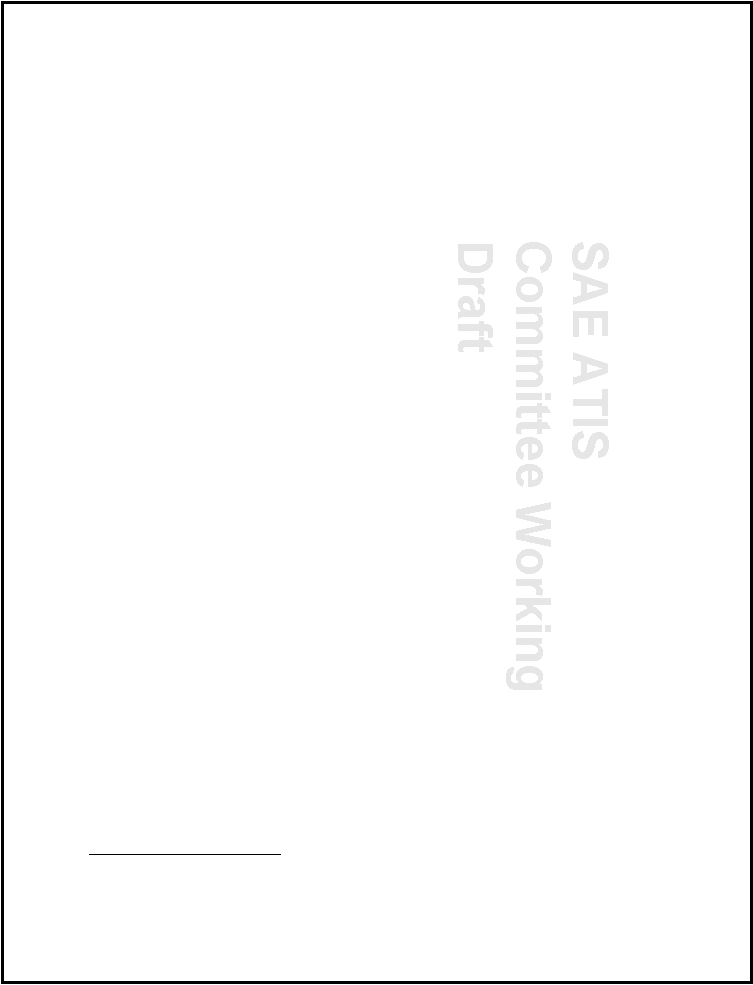
ITIS Phrase Tables, Draft [issued: 04-11-09]
-
229 -
This is a draft document of the SAE ATIS committee, subject to change.
8.12
Encoding with Allowed Maneuvers
The use of the allowed-maneuver codes in signs and phrases varies slightly from that of other ITIS codes.
These codes are intended be used when the need arises to represent a specific set of allowed maneuvers the
driver can make, typically from a single lane to which the expression is applied. Their MUTCD posted
sign equivalents are typically expressed as graphical direction arrows.
This category differs from the arrows and locations found in the MUTCD-locations category and its
practical use also differs (that category is typically used to denote locations not maneuvers
8
). In use, the
category is simply a single phrase chosen to reflect the designated data. It may be followed by additional
qualifier phrase data regarding its use and application (only, on green, except buses, after 4 PM, etc.)
<allowed maneuver><other data as needed>
The category entries are made up of a set of 7 bits in the lower byte in a pattern, each describing one
possible lane maneuver from the perspective of the driven vehicle (the upper byte being always set to 44).
A bit set to one indicates that that specific maneuver may be made. All 128 possible combinations are
expressed in the enumerated list. The 8th bit is reserved and always set to zero, and in this way is like the
locally defined codes reserved in the other categories (however, no locally defined codes exist for this
category).
Repeating the data found in previously in the standard, the maneuvers are abbreviated as follows:
LU
= Left Hand U-Turn
Bit 7
LT
= Left Hand Turn
Bit 6
L45
= Left Hand 45 degree turn (soft left) or curve
Bit 5
S
= Straight Ahead
Bit 4
R45
= Right Hand 45 degree turn (soft right) or curve
Bit 3
RT
= Right Hand Turn
Bit 2
RU
= Right Hand U-Turn
Bit 1 (the LSB bit)
Note that this system works for nations that drive on either the right or left side of the road. In the case of
the US (driving on the right) the bit for “Right Hand U-Turn” makes no practical sense and is never found
set to one. In a similar fashion, the “Left Hand U-Turn” bit is not used in countries which drive on the left
side.
Note that this system allows encoding both right and left “45 degree” turns (also called a “soft” turn),
intended for describing those times when multiple turning paths are allowed. Such as an intersection where
more than one left hand turn can be made, for example where the additional lane is the entrance ramp for a
freeway. In general use these bits are not to be set unless such a path exists. Therefore, as an example, a
lane where left hand turns are allowed as well as left hand U-turns would be encoded with only the LT and
LU bits set (and not the L45 bit). The L45 bit, as well as the other bits (S, R45,RT, RU) would all be set to
zero in such a case.
8
Hint: If the sign to be expressed covers multiple lanes or could be applied equally to drivers in
multiple lanes, then any needed arrow should be chosen from the MUTCD-Locations category and not the
allowed-maneuvers category.

